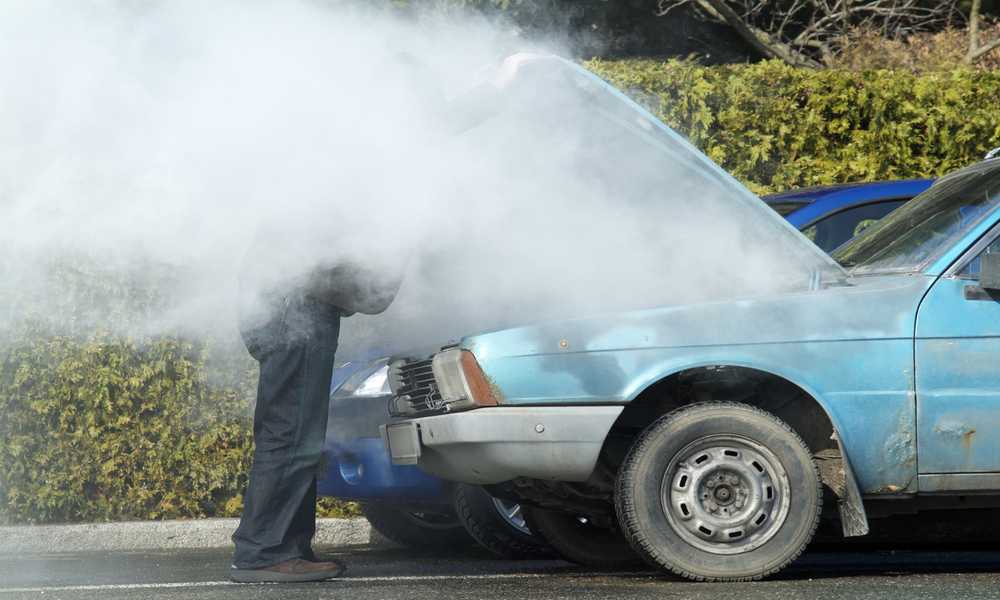Is your engine overheating? It’s a problem that no car owner wants to deal with. But before you panic and start imagining the worst-case scenarios, let’s explore some of the common causes of engine overheating and how they can be fixed. One potential culprit that often goes overlooked is low transmission fluid. Yes, you heard that right! Low transmission fluid levels can actually contribute to your engine running hot. In this blog post, we’ll delve into the relationship between can low transmission fluid cause engine overheating, as well as provide some practical tips on keeping your vehicle cool and running smoothly. So buckle up and get ready for some valuable insights!
Causes your engine overheating
1. Improper coolant/water mixture

Improper coolant/water mixture is one of the common causes of engine overheating. When your vehicle’s cooling system doesn’t have the right balance of coolant and water, it can lead to serious issues.
The purpose of coolant is to transfer heat away from the engine and prevent it from overheating. It also helps maintain a consistent temperature throughout various weather conditions. If there is too much water in the mixture, it can cause boiling at high temperatures, leading to engine overheating.
On the other hand, if there is too much coolant in the mixture, it will not be able to effectively transfer heat away from the engine. This imbalance can result in reduced cooling efficiency and potential overheating problems.
To avoid this issue, always follow your vehicle manufacturer’s recommendations for coolant-to-water ratio when topping up or flushing your cooling system. Typically, a 50/50 mix of antifreeze (coolant) and distilled water works well for most vehicles. Regularly checking your coolant levels and ensuring that you have the correct mixture will help keep your engine running smoothly and prevent unnecessary overheating issues down the road
2. Low coolant
Low coolant levels can also contribute to engine overheating. Coolant, also known as antifreeze, is responsible for regulating the temperature in your engine by absorbing heat and transferring it to the radiator where it can be cooled down.
When there is not enough coolant in the system, it cannot effectively absorb and transfer heat, leading to increased temperatures inside the engine. This can result in overheating and potential damage to various components.
There are several reasons why coolant levels may be low. One common cause is a leak in the cooling system, which allows coolant to escape and reduces overall levels. Another possibility is that the coolant has become diluted or contaminated over time. To fix low coolant levels, you should first check for any visible leaks in hoses, connections, or the radiator itself. If a leak is found, it should be repaired immediately to prevent further loss of coolant.
Additionally, if you notice that your vehicle consistently requires topping up with coolant, it may be necessary to flush out and replace old or contaminated fluid. Regular maintenance checks on your vehicle’s cooling system will help ensure that coolant levels remain at an appropriate level and reduce the risk of engine overheating caused by low coolant.
3. Bad thermostat
When it comes to engine overheating, a faulty thermostat can be one of the culprits. Your car’s thermostat plays a crucial role in regulating the coolant flow and maintaining an optimal engine temperature.
A bad thermostat can get stuck closed, preventing coolant from flowing through the radiator and causing your engine to overheat. On the other hand, if it gets stuck open, your engine may take longer to reach its operating temperature, leading to poor fuel efficiency and decreased performance.
Replacing a bad thermostat is typically an affordable fix that can help prevent further damage to your engine. If you notice signs such as fluctuating temperature gauge readings or coolant leaks around the thermostat housing, it’s important not to ignore them.
Regular maintenance and inspections are essential for keeping your cooling system in good working condition. This includes checking and replacing the thermostat when necessary. Remember, a malfunctioning thermostat is just one potential cause of engine overheating. It’s important to address any underlying issues promptly and seek professional assistance if needed
4. Failed water pump

The water pump plays a crucial role in keeping your engine cool. It circulates coolant throughout the engine, helping to regulate its temperature. However, if the water pump fails, it can lead to severe overheating issues. When the water pump fails, it is typically due to a bearing or seal failure. This can cause coolant leaks and prevent proper circulation of coolant through the engine. As a result, your engine may start to overheat.
If you suspect that your water pump has failed, there are a few signs to look out for. You may notice coolant leaking from the front of your vehicle or hear a whining noise coming from the engine compartment. Additionally, an overheating gauge on your dashboard could be an indication of water pump failure. To fix this issue, you will need to replace the faulty water pump with a new one. It’s important not to ignore this problem as continued overheating can cause significant damage to your engine.
Regular maintenance and inspections can help catch any potential issues with your water pump before they become major problems. Make sure to have it checked during routine service appointments or if you notice any warning signs mentioned above. Remember that addressing any cooling system problems promptly is essential for preventing further damage and potentially costly repairs down the line!
5. Broken radiator fan
A broken radiator fan can be another culprit behind engine overheating. The radiator fan is responsible for pulling air through the radiator to cool the coolant and prevent the engine from getting too hot. If the fan is not functioning properly, it won’t be able to do its job effectively.
There are several reasons why a radiator fan may break. It could be due to a faulty motor or wiring issues, or it may have become stuck or jammed with debris over time. Whatever the reason, when the radiator fan stops working, airflow is restricted and heat builds up in the engine.
When your car’s temperature gauge starts climbing into dangerous territory, it’s important to check if your radiator fan is running. You can do this by turning on your car and letting it idle while monitoring for any signs of movement from the fan blades.
If you suspect that your radiator fan is broken or not functioning correctly, it’s best to consult a mechanic who can diagnose and repair the issue promptly. Ignoring a broken radiator fan can lead to further damage to your engine and potentially expensive repairs down the line.
In conclusion (without using those words), ensuring that all components of your cooling system are in good working order is crucial for preventing engine overheating. A broken radiator fan should never be overlooked as one of potential causes of an overheated engine
6. Broken belt
One of the potential causes of engine overheating is a broken belt within your vehicle’s cooling system. The belt plays a crucial role in driving the water pump, which circulates coolant through the engine and radiator to regulate its temperature.
When the belt breaks, it can cause the water pump to stop functioning properly or cease entirely. Without an effective circulation of coolant, heat builds up rapidly in the engine, leading to overheating. A broken belt can be caused by wear and tear over time or sudden damage from external factors. Regular maintenance and inspection of belts are essential to prevent any unexpected failures.
If you suspect that your vehicle’s belt is broken, it’s important to have it replaced as soon as possible. Ignoring this issue could result in severe engine damage and even complete failure if left unaddressed for too long.
Remember, prevention is key when it comes to maintaining your vehicle’s cooling system. Regular inspections and timely repairs can help prevent a broken belt from causing engine overheating issues down the road.
7. Low engine oil level

When it comes to engine overheating, there are several factors that can contribute to the problem. One often overlooked culprit is a low engine oil level. Oil plays a crucial role in keeping your engine cool and lubricated, so when the level is too low, it can lead to increased friction and heat buildup.
A low engine oil level can be caused by leaks or burning oil due to worn-out gaskets or piston rings. If you notice that your vehicle’s temperature gauge is rising or if you see smoke coming from under the hood, it could be a sign of low engine oil.
To prevent overheating related to low engine oil levels, it’s important to regularly check your oil levels and top up as necessary. Additionally, addressing any leaks or mechanical issues promptly can help maintain proper lubrication and cooling of the engine.
Remember that maintaining the right balance of fluids in your vehicle is essential for optimal performance and safety. So don’t neglect checking your engine oil regularly – it could save you from costly repairs down the road!
How to fix engine overheating?
When your engine starts to overheat, it’s important to take action quickly to prevent any further damage. Here are a few steps you can take to fix engine overheating. First, check the coolant level in your radiator. If it’s low, add more coolant until it reaches the proper level. You should also check for any leaks or cracks in the hoses that carry coolant throughout your engine.
Next, make sure your thermostat is functioning properly. A faulty thermostat can cause your engine to overheat by not allowing enough coolant flow. If necessary, replace the thermostat with a new one. If these steps don’t solve the issue, it’s time to inspect the water pump and radiator fan. A failed water pump can result in inadequate cooling while a broken radiator fan won’t be able to dissipate heat effectively.
Another potential culprit could be a worn-out or broken belt that drives the water pump and fan. Inspect the belt for signs of wear and replace if necessary. Ensure that your engine oil level is sufficient as low oil levels can contribute to overheating issues.
Remember, if you’re unsure about how to fix engine overheating yourself or if none of these solutions work for you, it’s always best to consult a professional mechanic who can diagnose and repair any underlying issues causing your engine temperature problems.
Can low transmission fluid cause engine overheating?
Low transmission fluid can indeed cause engine overheating, although it is not the most common cause. The transmission and engine work closely together, so a problem in one area can affect the other. When there is low transmission fluid, it puts additional strain on the transmission system. This strain can lead to increased friction and heat generation. As a result, the overall temperature of the engine can rise.
Furthermore, if there is a leak in the transmission system that causes low fluid levels, it may also lead to overheating. A leak will not only result in insufficient lubrication but also allow contaminants to enter the system which can further contribute to excessive heat buildup.
To prevent such issues, regular maintenance of both your engine and transmission systems is crucial. Make sure to check your fluids regularly and address any leaks promptly. Properly maintaining your vehicle’s cooling system will help ensure that all components are functioning optimally and reduce the risk of overheating.
While low transmission fluid alone may not be a common cause of engine overheating, it can certainly contribute to this issue when combined with other factors like leaks or lack of proper maintenance. So always keep an eye on your car’s fluids to avoid potential problems down the road!
What to do when your car overheats?
When your car starts to overheat, it can be a nerve-wracking experience. However, it’s important to stay calm and take immediate action to prevent further damage. Here are some steps you can take when your car overheats. Safely pull over to the side of the road and turn off your engine. This will help prevent any additional heat buildup in the engine. Next, pop open the hood but be careful not to touch any hot surfaces.
Check the coolant level in the radiator and reservoir tank. If it’s low, add coolant or water (if necessary) but never remove the radiator cap while the engine is still hot as this can cause serious burns. Once you’ve added coolant or water, wait for a few minutes to allow everything to cool down before attempting to start your vehicle again. Keep an eye on the temperature gauge while driving and listen for any unusual sounds coming from under the hood.
If these steps don’t resolve the issue or if your car continues to overheat frequently, it’s best to consult a professional mechanic who can diagnose and repair any underlying problems with your cooling system. Remember that regular maintenance is key in preventing overheating issues. Make sure you have your cooling system checked regularly and keep an eye on fluid levels such as coolant, oil, and transmission fluid.
Taking prompt action when your car overheats can save you from costly repairs down-the-line! Stay vigilant about maintaining proper fluid levels and addressing any issues promptly; this will help ensure smooth drives without worrying about engine overheating!
Does transmission affect engine temperature?
Does transmission affect engine temperature? This is a common question that many car owners ask. The transmission and the engine are two separate systems in a vehicle, but they are interconnected in certain ways.
The transmission plays a crucial role in transferring power from the engine to the wheels. It uses fluid to keep everything running smoothly. However, if there is an issue with the transmission and it starts overheating, it can indirectly impact the engine’s temperature.
When the transmission overheats, it can cause excessive friction and heat buildup which can lead to increased temperatures throughout the entire system. The hot transmission fluid circulating through various components could transfer some of that heat to the engine coolant or radiator. This added heat can put additional strain on your cooling system and potentially contribute to higher engine temperatures.
Moreover, some vehicles have a cooler for their automatic transmissions that utilize coolant from the radiator to help regulate its temperature. If there is a problem with this cooler such as leaks or blockages, it could result in insufficient cooling for both the transmission and ultimately, the engine.
While there may not be a direct cause-and-effect relationship between low transmission fluid and engine overheating, issues within your vehicle’s transmission can indirectly impact your engine’s temperature by introducing excess heat into other parts of your cooling system. Therefore, maintaining proper functioning of both systems is essential for preventing potential overheating problems down-the-line.
How to keep your engine cool?
How to keep your engine cool? One of the most important things you can do to prevent engine overheating is to maintain proper coolant levels. Make sure you regularly check and top up your coolant. This will help regulate the temperature of your engine and prevent it from getting too hot.
Another way to keep your engine cool is by ensuring that the radiator fan is in good working condition. The fan helps draw air through the radiator, which cools down the coolant as it passes through. If the fan isn’t functioning properly, it won’t be able to effectively cool down the engine.
Regularly inspecting and replacing worn-out belts is also crucial for maintaining an optimum operating temperature for your engine. A broken belt can cause all sorts of problems, including overheating. Additionally, keeping an eye on your oil level can also contribute to a cooler-running engine. Low oil levels can lead to increased friction and heat buildup within the engine components.
Avoid pushing your vehicle too hard in extreme weather conditions or during heavy loads. Overworking your engine can put excessive strain on its cooling system, leading to overheating issues. By following these tips and being proactive about maintaining your vehicle’s cooling system, you’ll greatly reduce the risk of experiencing an overheated engine while driving!
Can your car overheat without transmission fluid?
Can your car overheat without transmission fluid? This is a common question among car owners, and the answer is yes. While low transmission fluid does not directly cause engine overheating, it can contribute to other issues that may lead to overheating.
Transmission fluid plays a crucial role in keeping your transmission cool and lubricated. Without enough fluid, the transmission can become hot and start to malfunction. However, the engine itself has its own cooling system separate from the transmission.
If your car overheats due to low or leaking transmission fluid, it’s usually because of an underlying problem with the cooling system or engine oil level. Low coolant levels or a faulty thermostat can cause the engine temperature to rise rapidly. Additionally, if there is a leak in the coolant system or an issue with the water pump, this can also result in overheating.
It’s important to address any issues related to low transmission fluid as soon as possible by checking for leaks and ensuring proper levels are maintained. Regular maintenance checks will help prevent problems before they escalate into more serious issues like engine overheating.
Remember, while low transmission fluid may not directly cause engine overheating on its own, neglecting it could lead to complications that affect overall vehicle performance. So be proactive in maintaining all essential fluids—including both coolant and transmission—as part of your regular automotive care routine!
Can a transmission fluid leak cause overheating?

A transmission fluid leak in your vehicle can indeed lead to overheating issues. Transmission fluid plays a crucial role in the proper functioning of your car’s transmission system, which helps transfer power from the engine to the wheels. When there is a leak in the transmission system and fluid levels drop significantly, it can cause excessive friction and heat. This additional heat can then spread throughout the engine, leading to overheating.
Furthermore, low transmission fluid levels can also affect other components of your vehicle, such as the torque converter and clutch plates. These components rely on adequate lubrication provided by transmission fluid to prevent excessive wear and heat buildup. Without enough fluid, these parts may start malfunctioning or even fail altogether.
To avoid potential overheating caused by a transmission fluid leak, it is essential to regularly check for any signs of leakage or drops in fluid levels. If you notice any leaks or suspect low levels of transmission fluid, it is recommended to have your vehicle inspected by a professional mechanic who specializes in transmissions. Remember that addressing any issues with your car’s transmission promptly not only prevents overheating but also ensures the longevity and reliability of your vehicle overall.
Is my transmission overheating?
Your transmission plays a crucial role in the smooth functioning of your vehicle. But what happens when it starts to overheat? Is that even possible? Well, yes, it is! Just like any other component in your car, the transmission can also overheat if not properly maintained or if there are underlying issues.
One of the main causes of transmission overheating is a low fluid level. When there isn’t enough fluid to lubricate and cool down the transmission, heat builds up rapidly. This can lead to damage and ultimately result in costly repairs.
Another potential cause of transmission overheating is a faulty cooling system. If the radiator or cooling lines are clogged or damaged, they won’t be able to effectively regulate the temperature of the transmission fluid. As a result, overheating may occur.
Hard driving conditions such as towing heavy loads or prolonged periods of stop-and-go traffic can also contribute to transmission overheating. These situations put extra strain on your vehicle’s components and increase heat build-up.
To prevent your transmission from overheating, make sure you regularly check and maintain proper fluid levels. Additionally, have your cooling system inspected by a qualified mechanic to ensure it’s working efficiently. In conclusion (as requested), keeping an eye on your transmission’s temperature is essential for maintaining its longevity and preventing costly repairs down the line.
Final thoughts
While low transmission fluid may not directly cause engine overheating, it can certainly contribute to the problem if left unaddressed. It is essential to understand that maintaining proper levels of both coolant and transmission fluid are crucial for the overall health and performance of your vehicle.
If you notice any signs of low transmission fluid or engine overheating, it is important to address them promptly. Regularly checking your fluids, scheduling routine maintenance, and addressing any leaks or mechanical issues can help keep your engine running smoothly and prevent overheating.
Remember, prevention is key when it comes to avoiding costly repairs or breakdowns. By being proactive in caring for your car’s cooling system and transmission, you can enjoy a smooth driving experience without worrying about engine overheating.
So, stay vigilant with regular check-ups on all vital fluids in your vehicle. Keep an eye out for warning signs like low coolant levels or transmission problems. And most importantly, take action immediately when something seems amiss. By taking these simple steps and staying proactive about maintenance, you’ll be able to avoid potential issues down the road – keeping your car running efficiently and ensuring optimal performance.
Safe travels!



